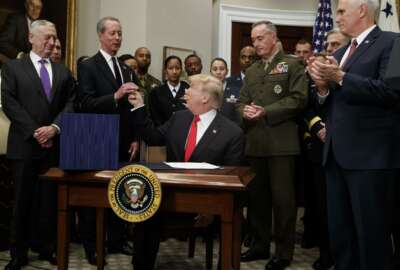
Thornberry: ‘I don’t think the president will veto’ minibus spending package
The chairman of the House Armed Services Committee said he's confident President Trump will sign a "minibus" package of 2019 spending bills, despite threats to veto...
The chairman of the House Armed Services Committee said Tuesday he’s confident President Donald Trump will sign the “minibus” package of spending bills that will make up a majority of fiscal 2019 appropriations.
“I don’t think the president will veto it,” Rep. Mac Thornberry (R-Texas) said in a meeting with reporters on Capitol Hill. “He’s frustrated about the wall, but a central thrust that he has been completely consistent on, from the beginning of his presidency, is to rebuild the military, and this is the biggest step yet toward that goal.”
The House on Wednesday passed the spending package, which now goes to the Senate for final approval.
Trump, speaking to reporters at the United Nations on Wednesday, said he would sign the spending package, according to the Associated Press.
“We’re going to keep the government open,” Trump said.
The House is expected to approve the spending bill in a floor vote Wednesday.
In March, Trump passed an omnibus spending package for the remainder of FY 2018, but had threatened to veto it over a lack of funding for a border wall between the United States and Mexico.
I am considering a VETO of the Omnibus Spending Bill based on the fact that the 800,000 plus DACA recipients have been totally abandoned by the Democrats (not even mentioned in Bill) and the BORDER WALL, which is desperately needed for our National Defense, is not fully funded.
— Donald J. Trump (@realDonaldTrump) March 23, 2018
The minibus spending package covers funding for the departments of Defense, Labor, and Education, and cover roughly 90 percent of annual spending for FY 2019.
Congress aims to pass the spending package before Oct. 1 to avoid a partial government shutdown.
If passed before the deadline, Thornberry pointed out that this would be the first time Congress has approved funding for DoD on-time in a decade.
“I think he understands the achievement for the military,” Thornberry said. “I think he also understands the achievement of getting a big majority of discretionary spending in place before the beginning of the fiscal year.”
Army misses recruiting goal for first time in 13 years
Last Friday, the Army reported missing its recruiting goal by about 6,500 soldiers, despite offering more than $200 million in bonuses.
It’s the first time the service has missed this benchmark since 2005.
“We’re going to have to be innovative in recruiting and retaining talent,” Thornberry said. “As the economy does better, that’s going to get harder, not easier.”
Due to that increase in competition, he said it’s important lawmakers arrived at a 2.6 percent pay raise for members of the military in the final National Defense Authorization Act (NDAA) agreement.
Thornberry noted that a 2.6 percent raise, versus a previously proposed 2.3 percent raise, wouldn’t necessarily dissuade someone from staying or joining the military ranks, but added that “it’s a symbol saying we value what you do, and we are going to not cut back on the pay raise that the formula says you ought to have.”
Thornberry sees value in DoD audit, despite caveats
Amid budget concerns on Capitol Hill, DoD continues its efforts to complete its first-ever annual audit. Despite expectations that the Pentagon will not get a clean opinion back from auditors, Thornberry said the number-crunching will prove to be a worthwhile exercise.
“I suspect there will be people who try to demagogue the issue, like there are people who try to demagogue every issue. But it’s pretty hard to argue that you shouldn’t ask the questions, which is basically what the audit does, you shouldn’t find the problems, which is what the audit does, and be committed to fixing the problems,” Thornberry said, adding that’s what David Norquist, DoD’s comptroller and chief financial officer, aims to do through the audit.
“People may try to abuse the fact that, for the first time ever, there will be an audit, but that cannot deter us from making sure it happens … We know what a big deal this is to finally have an audit, and that with so many IT data systems that do not talk to one other, there’s going to be all sorts of problems. We just need to hold their feet to the fire at fixing those problems.”
Copyright © 2025 Federal News Network. All rights reserved. This website is not intended for users located within the European Economic Area.
Jory Heckman is a reporter at Federal News Network covering U.S. Postal Service, IRS, big data and technology issues.
Follow @jheckmanWFED





